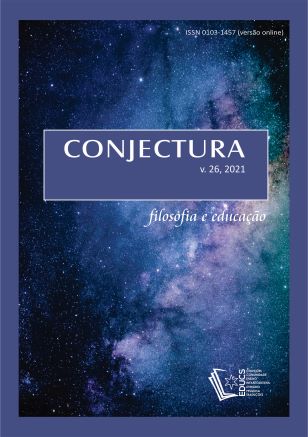Interculturality: an experience of exchange of letters between students from Brazil and Japan
DOI:
https://doi.org/10.18226/21784612.v26.e021009Abstract
The aim of this article is to promote an analysis of the intercultural experience carried out through the exchange of letters with children from the city of Ninomiya, Kanagawa Province – Japan, with children from the Municipal Education Network of the Veranópolis, Rio Grande do Sul – Brazil. The exchanges take place annually through the Post and Telegraph service in Brazil and Japan, between students from the 3rd to 9th years of this network. Japanese children write to Veranians and vice versa. They tell facts about their routine, their city, peculiar aspects of their daily lives, including photos and geographic and cultural characteristics specific to each local space. This experience invites us to expand our gaze on the importance of thematizing, in the educational process, sociocultural aspects of different peoples, social groups, customs and ways of being and living together. We challenge ourselves to reflect on how this practice of exchanging letters, between children from two very different countries, both socially and culturally, manages to raise awareness about issues related to interculturality as a field of debate about identity processes that constitute an environment. Furthermore, it allows us to analyze issues related to the ease of writing and the symbology used to describe aspects related to the daily life of each child, as well as the subjectivity in each message in the exchange of letters. The reciprocity in exchanges, the care with the details present in each report, the richness that makes up the writing and how everyday life presents itself with similarities and differences in the life of each student, whether here or in Japan, are essential components in the construction of this analysis .
Keywords: Local history. Interculturality. Education. Global citizenship.
References
BARDIN, L. Análise de conteúdo. São Paulo: Edições 70, 2011.
BOURDIN, A. A questão local. Rio de Janeiro: DP&A, 2001.
BLUMER, H. Sociedade como interação simbólica. PLURAL – Revista do Programa de Pós-Graduação em Sociologia da USP, São Paulo, v. 25, n. 2, p. 282-293, 2018.
BRANDÃO, A. C. P. Leitura e produção de textos na alfabetização. Belo Horizonte: Autêntica, 2005.
BURKE, P. O que é história cultural. 2. ed. Rio de Janeiro: Zahar, 2008.
CANDAU, V. M.; MOREIRA, F. A. Multiculturalismo: diferenças e práticas pedagógicas. 10. ed. Petrópolis, RJ: Vozes, 2013.
CRUZ, G. F. J.; LIMA, J. S. Evidências da cultura de ensinar e aprender línguas em narrativas e a formação do aprendiz autônomo. Revista de Letras, v. 4, n. 2, 2012.
FLEURI, M. R. Intercultura, educação e movimentos sociais no Brasil. V Colóquio Internacional Paulo Freire. Recife, setembro 2005. Disponível em: http://ebookbrowse.com/fleuri-2005-recife-resumo-e-texto-completo-pdf- -d218364786. Acesso: 20 jun. 2019.
FURTER, P. Educação e vida. 11. ed. Petrópolis: Vozes, 1987.
GASKELL, G. Entrevistas individuais e grupais. In: BAUER, M. W.;GASKELL, G. (org.). Pesquisa qualitativa com texto, imagem e som: um manual prático. Petrópolis: Vozes, 2002. p. 64-89.
GÓMEZ, A. I. P. Educação na Era Digital: a escola educativa. Trad. de Marisa Guedes, Porto Alegre: Penso, 2015.
HALL, S. A identidade cultural na pós-modernidade. 11. ed. Rio de Janeiro: DP&A, 2006.
LINS e SILVA, M. E. “Cara professora”: as práticas de escrita de um grupo de docentes. 2004. Tese (Doutorado em Educação – Universidade Federal de Minas Gerais, Belo Horizonte, 2004.
NUSSBAUM, M. Sem fins lucrativos. Por que a democracia precisa das humanidades. Trad. de Fernando Santos. São Paulo: Martins Fontes, 2015.
PAIS, J. M.; LACERDA, M. P. C.; OLIVEIRA, V. N. Juventudes contemporâneas, cotidiano e inquietações de pesquisadores em Educação – uma entrevista com José Machado Pais. Educar em Revista, Curitiba, n. 64, p. 301-313, abr./jun. 2017.
UNESCO. United Nations Educational, Scientific and Cultural Organization.
Educação para a cidadania global: preparando alunos para os desafios do século XXI. Coordenação: Setor de Educação da Representação da Unesco no Brasil. Trad. de Rita Brossard. Brasília, DF: Unesc, 2015.
Downloads
Published
How to Cite
Issue
Section
License
1. The publication of the originals will imply the assignment of copyright to Conjectura Journal.
2. Texts cannot be reproduced without authorization from the Journal after acceptance.









